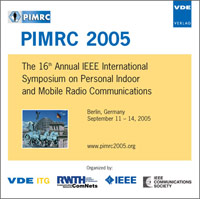Auction Driven Dynamic Spectrum Allocation: Optimal Bidding, Pricing and Service Priorities for Multi-rate, Multi-Class CDMA
Konferenz: PIMRC 2005 - 16th Annual IEEE International Symposium on Personal Indoor and Mobile Radio Communications
11.09.2005 - 14.09.2005 in Berlin, Germany
Tagungsband: PIMRC 2005
Seiten: 5Sprache: EnglischTyp: PDF
Persönliche VDE-Mitglieder erhalten auf diesen Artikel 10% Rabatt
Autoren:
Rodriguez, Virgilio; Moessner, Klaus; Tafazolli, Rahim (CCSR, The University of Surrey, Guildford, Surrey GU2 7XH, UK)
Inhalt:
Dynamic spectrum allocation (DSA) seeks to exploit the variations in the loads of various radio-access networks to allocate the spectrum efficiently. Here, a spectrum manager implements DSA by periodically auctioning short-term spectrum licenses. We solve analytically the problem of the operator of a CDMA cell populated by delay-tolerant terminals operating at various data rates, on the downlink, and representing users with dissimilar "willingness to pay" (WtP). WtP is the most a user would pay for a correctly transferred information bit. The operator finds a revenue-maximising internal pricing and a service priority policy, along with a bid for spectrum. Our clear and specific analytical results apply to a wide variety of physical layer configurations. The optimal operating point can be easily obtained from the frame-success rate function. At the optimum, (with a convenient time scale) a terminal’s contribution to revenues is the product of its WtP by its data rate; and the product of its WtP by its channel gain determines its service priority ("revenue per Hertz"). Assuming a second-price auction, the operator’s optimal bid for a certain spectrum band equals the sum of the individual revenue contributions of the additional terminals that could be served, if the band is won.


